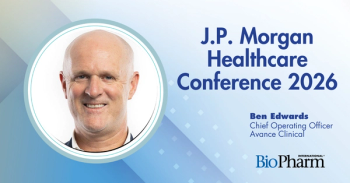
- BioPharm International-09-02-2009
- Volume 2009 Supplement
- Issue 5
Contract Consulting & Pharmaceutical Services - Part 2
To assess current trends in outsourcing, BioPharm International turned to Mark Douglas, PhD, strategic business development manager, Avecia Biologics Ltd; Geoffrey M. Glass, senior vice president of strategy, corporate development and business integration, Patheon Inc.; Rob Gustines, director of marketing, KBI Biopharma, Inc.; Jon S. Kauffman, PhD, director, method development & method validation and biopharmaceutical services, Lancaster Laboratories; Roger Lias, PhD, president, Eden Biodesign, Inc.; John A. McCarty, vice president, formulation sciences and drug delivery, Azopharma; and Michiel E. Ultee, PhD, vice president, process sciences, Laureate Pharma, Inc.
To assess current trends in outsourcing, BioPharm International turned to Mark Douglas,PhD, strategic business development manager, Avecia Biologics Ltd; Geoffrey M. Glass, senior vice president of strategy, corporate development and business integration, Patheon Inc.; Rob Gustines, director of marketing, KBI Biopharma, Inc.; Jon S. Kauffman, PhD, director, method development & method validation and biopharmaceutical services, Lancaster Laboratories; Roger Lias, PhD, president, Eden Biodesign, Inc.; John A. McCarty, vice president, formulation sciences and drug delivery, Azopharma; and Michiel E. Ultee, PhD, vice president, process sciences, Laureate Pharma, Inc.
Q: In what service areas are you currently seeing the most interest, and in what areas do you see the most growth in the next few years?
Douglas: We are seeing consistent growth across all areas. There isn't one that stands out as being exceptional.
Glass: We see demand across all of our service lines in contract manufacturing, as well as our pharmaceutical development services business that focuses on early-stage companies. Given the number of manufacturing plant closures that should occur as a result of mergers and patent expiry, we expect that our restructuring services, where we help companies wind-down and close plants, will see high demand in 2010.
Gustines: Process development and the ability to transfer into manufacturing . . . and do it well. In particular, the ability to enhance the development processes of more complex molecules, nail the tech transfer, and then deliver on the manufacturing program. There is increasing interest in services that can improve the performance of the molecule, whether defined as expression efficiency or developing formulations that maintain stability of the molecule, especially for more complex, highly engineered proteins.
Kauffman: We are seeing interest in characterization in early phases and development and validation of methods in support of clinical stability and release.
Lias: We are somewhat unusual in that, in addition to offering a very broad range of services from cell line development to production, we provide cGMP production services for viral products as well as biopharmaceuticals derived from both mammalian and microbial expression systems. Our client base splits roughly equally between the three production platforms. There has been continued good demand for viral projects (both vaccines and gene therapy related). In our experience, demand for process development and clinical-phase cGMP production services has remained pretty robust, despite the global economic situation.
McCarty: Full product development projects are still the backbone of our work and will continue to be such.
Ultee: We have seen a significant increase in fusion molecules or proteins. Already this year we have worked on three different ones, in different stages of development and production.
Q: There is currently some excess in-house biopharmaceutical manufacturing capacity in the industry, and upstream titers are continuing to go up. What affect is this now having on CMOs? What effect do you think it will have in the next 5–10 years?
Douglas: We aren't terribly worried about the excess in-house capacity. In our experience, outsourcing companies tend to prefer working with full time CMOs, who are only driven by their customers' priorities, than with biopharma companies who have spare capacity but an overarching need to service their own pipelines. The recent interest in biologics from mainstream pharma should serve to keep the CMO world healthy during the next 5 years or so.
Gustines: Technology fit is always an industry issue, that is, it's always a challenge to match the facility capacity scale to product requirements and be perfectly right-sized. So CMOs that are capable of 1) adapting technologies both upstream and downstream to match scale and yield and 2) quickly develop expertise in the latest accepted technology trends will succeed in meeting the needs of the market whether the market is in a state of overcapacity or not. Industry undercapacity and overcapacity will always be in flux.
Kauffman: CMOs are under tremendous pressure to provide a cost benefit and on-time delivery more than ever. It may lead to some consolidation in the next 5–10 years.
Lias: It depends on the product pipeline and rate of approvals! While there is certainly excess capacity available currently, it is not always easy to match products/processes to available capacity (for both technical and business reasons) and a single new blockbuster drug with relatively low production titer could significantly affect things. It must be assumed that current excess capacity is impacting the larger commercial-scale CMOs to some extent, but it has little direct impact on the clinical-scale production market where we do most of our business. If anything, it may be advantageous to us, as we have a formal collaboration with Human Genome Sciences to assist them in filling large-scale production capacity. The increasing upstream titers undoubtedly have the potential to reduce the need for very large-scale facilities (e.g., 20,000-L mammalian) in the future.
McCarty: Obviously, companies with excess capacity will keep much of the work in house, unless outsourcing fulfills a need for which they currently do not have the technological expertise. Companies that have to outsource for reasons of lack of technology will most likely in the long run bring this capacity and know-how in house.
Ultee: Excess capacity in house rarely translates into a sustainable CMO business for the biopharmaceutical firm with its own products. At best, its effect on the CMO market is transitory. The increasing titers suggest that giant stirred-tanks (20–25,000 L) may no longer be viable, except for the few blockbuster, high-dose biopharmaceuticals.
Articles in this issue
over 16 years ago
Contract Consulting & Pharmaceutical Services - Part 1over 16 years ago
Contract Consulting & Pharmaceutical Services - Part 3over 16 years ago
Downstream Processingover 16 years ago
Contract Consulting & Pharmaceutical Services - Part 1over 16 years ago
Single-Use Bioprocessing Equipmentover 16 years ago
Laboratory Equipmentover 16 years ago
Information Technology, Automation, and Process Controlover 16 years ago
Fermentation and Cell CultureNewsletter
Stay at the forefront of biopharmaceutical innovation—subscribe to BioPharm International for expert insights on drug development, manufacturing, compliance, and more.




